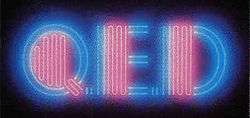Q.E.D. (British TV series)
Q.E.D. (quod erat demonstrandum, Latin for "that which was to be demonstrated") was the name of a strand of BBC popular science documentary films which aired in the United Kingdom from 1982 to 1999.[1]
| Q.E.D. | |
|---|---|
 Q.E.D. title card | |
| Country of origin | United Kingdom |
| Production | |
| Executive producer(s) | Mick Rhodes (1982–84), David Filkin (1985–91), Simon Campbell-Jones (1992), Susan Spindler (1993–94), Tim Haines (1994), Lorraine Heggessey (1995–97), Michael Mosley (1998–99) |
| Producer(s) |
|
| Running time | 30 min |
| Release | |
| Original network | BBC1 |
| Picture format | PAL |
| Original release | 1982 – 1999 |
Format
Running in a half-hour peak-time slot on the BBC's primary mass-audience channel BBC1, the series had a more populist and general interest agenda than the long-running Horizon series which aired on the more specialist channel BBC2.
Horizon could often be difficult for a scientific novice, requiring a modicum of background knowledge beyond the reaches of many viewers, so Q.E.D. was a more approachable way of introducing scientific stories.
Some notable films
- A Guide to Armageddon (1982) – the effects of a one megaton nuclear bomb being exploded over London.[2][3] Director Mick Jackson went on to direct the 1984 docu-drama Threads, an account of a nuclear holocaust and its effect on the working class city of Sheffield, England, and the eventual long-term effects of nuclear war on civilization.[4]
- Simon's War (1983) – the life of Simon Weston, who suffered serious burns in the Falklands War
- Big Brother's Little Test (1983) – How reliable is polygraphy, the use of lie-detectors? Can the innocent be unjustly condemned? Can the guilty beat them?
- In at the Deep End (1984) – an experiment in which divers spent nine days at simulated depths of up to 1000 feet, breathing a mixture of hydrogen and oxygen
- Round Britain Whizz (1986) – a sped-up flight around the coastline of Britain, with guest appearances of Patrick Moore, David Bellamy and Clay Jones
- The Foolish Wise Ones (1987) – a look at the talents and worlds of Autistic Savants, such as Stephen Wiltshire
- With a Goal in Mind (1988) – A sport psychologist works with First Division Queen's Park Rangers for a period of six weeks.
- John's Not Mad (1989) – follows a 15-year-old boy with severe Tourette syndrome
- My Best Friend's a Computer (1990) – explores the effects of computers on the emotional development of children
- Nerve Transplant (1997) – explores the work of a unique nerve transplant surgeon, bringing back movement to the limbs of previously paralysed patients
- Superspecs (1997) – follows the travels of a British inventor around Ghana with a pair of glasses made for just a dollar, that he is convinced could save the sight of millions
- The Burning Question (1998) – on spontaneous human combustion
- Breathless (1998) – investigates the Buteyko method for treating asthma
gollark: There's a "download full-text PDF" button right there.
gollark: It seems to be free for me.
gollark: Why?
gollark: I simply emit microwaves directly.
gollark: https://www.researchgate.net/publication/232494603_Can_People_Behave_Randomly_The_Role_of_Feedback
See also
References
External links
- Q.E.D., British Film Institute. List of films, with dates.
- Q.E.D. on IMDb
This article is issued from Wikipedia. The text is licensed under Creative Commons - Attribution - Sharealike. Additional terms may apply for the media files.